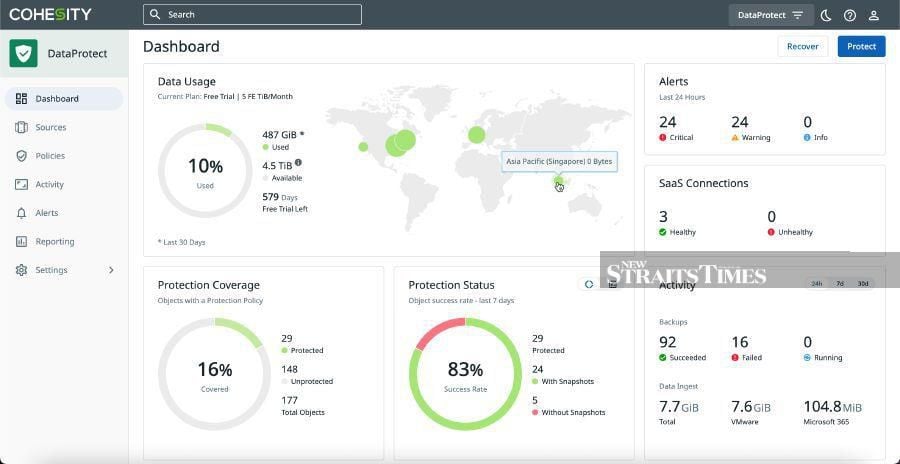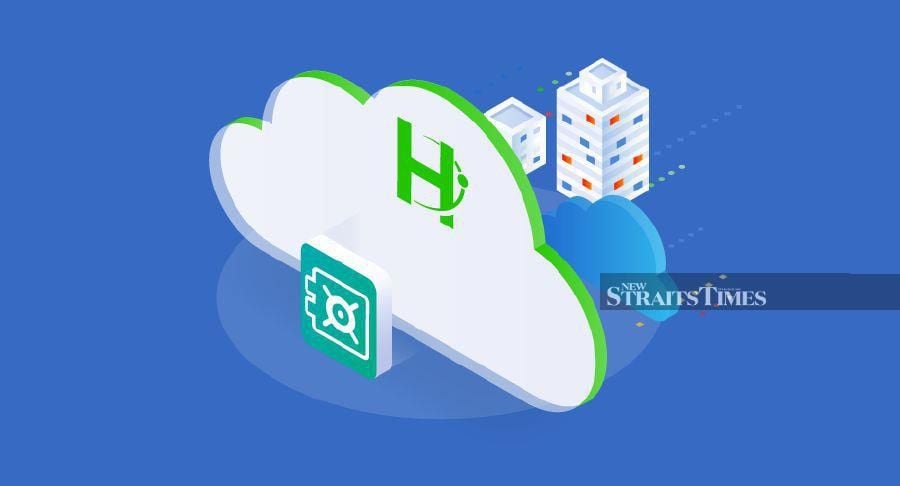DATA is a valuable resource to any organisation. In our digital-first world, data pours from many sources and data management has never been as important as it is today.
And, thanks to technology advancements, effective, efficient and secured data management is possible.
However, data management and data protection doesn't simply mean only knowing what types of data they have, or simply backing it up—it is a much harder task than many organisations realise.
Data management means understanding your data footprint, where data is housed, how it is protected, if it is recoverable should a disaster like a ransomware attack occur, and how fast it can be recovered.
The problem for many organisations, public and private, is that they rely on legacy data management technology, most of which are not developed to solve the IT and cyber threat challenges of today.
INTRODUCING DMaaS
DMaaS is a portfolio of 'software as a service' (SaaS) offerings - a type of cloud service, providing centralised storage where businesses are not required to purchase and manage data management infrastructure.
Data centre infrastructure management (DCIM) has been the popular solution for several years, however, it doesn't fit the industry's needs. For example, DCIM won't be able to gain insights from colossal volumes of data. In contrast, DMaaS performs such operations almost instantly.
DMaaS not only gives opportunities for enterprises to grow their recurring revenue business, it also allows them to expand existing managed service offerings without having to build out the infrastructure themselves.

Cohesity managing director for Asean Sheena Chin shares how the next-gen data management provider's latest product, Cohesity Data Management as a Service (DMaaS) is a proof that DMaaS is the future of data management as it satisfies the needs for a simple way to backup, secure, govern and analyse data.
Cohesity DMaaS is a as a service offerings hosted on AWS which offers two solutions – Backup as a Service (which is Cohesity DataProtect delivered as a Service), and Cohesity FortKnox which are now available in Southeast Asia, including Malaysia – the first of its kind in Asean.
MADE FOR VOLUMES
Organisations often found themselves unable to manage enormous data volumes efficiently and securely with available solutions and the cost to have their own infrastructure to house and manage data on premise is expensive.
This is where cloud solutions come into play. Cloud applications are virtually always delivered as a service and have been growing extensively for well over a decade amongst organisations, both public and private who accelerated their use of cloud applications and new technologies, or adopted them for the first time, to continue operating to meet the current needs—as well as to continue operations during the pandemic restrictions.
In Malaysia, as part of the government's ten-year digital economy blueprint, MyDigital, there are defined objectives when it comes to end-to-end online government services integration – usage of cloud storage amongst government agencies, growing start-ups, and pushing e-commerce – all of which will likely require or incorporate the use of SaaS solutions, which are only available through a SaaS consumption model, so SaaS adoption is dependent on customers' preferences.
The Cohesity DMaaS portfolio of solutions, on the other hand, is centred around "providing customers with a choice of how they would like to consume Cohesity offerings, so for us providing SaaS solutions is based on our objective to be customer centric".
SECURITY TECHNOLOGICAL FACTOR
Regardless of an organisation's size, the management and protection of data should be an operational imperative.
Legacy technology is haphazard because it is often so complex to manage that a time-intensive costly 'DIY' approach is often required in order to integrate multiple products from multiple vendors, or a customised process, workloads, and even apps to be developed.
According to Chin, legacy data management technology was not designed to operate in an integrated technology environment – for example, integrating with modern orchestration and automation tools, running critical external applications for analytics, or aligning with compliance and reporting objectives.
And, she said, the problems caused by legacy data management technology extends alarmingly to how this technology stacks up against sophisticated cyberattacks.
"Attack surfaces of organisations are significantly extended by this isolated and old technology, which doesn't share common security policies or provide visibility to IT teams of irregular behaviour and potential threats present within organisations' technology ecosystems.
"What we consistently hear from customers around the globe is that data security is top of mind given the rise in ransomware and other cybersecurity threats, so we decided to make available data management SaaS solutions that pointedly address those problems first in opening up DMaaS to Asean, with Cohesity Backup as a Service and Cohesity FortKnox," shared Chin.
These two SaaS solutions provide users with a choice in how they consume Cohesity's DataProtect backup solution (BaaS), and "with FortKnox, customers have access to a data isolation vault that is a cost-effective alternative to traditional offsite tape backups, which may not be financially or operationally feasible (due to required recovery timeframes) for some organisations".

NEXT-GEN DATA MANAGEMENT
While there are certainly industries that are handling larger amounts of data or sensitive data, such as the financial services, banking, healthcare, public sector, Chin said, all organisations can benefit from Cohesity DMaaS.
"We believe customers will enjoy the added choice and flexibility that DMaaS offerings provide them in being able to consume Cohesity's data management offerings the way they want.
"Customers have the full freedom to decide which delivery method they want to use for their individual needs, whether that's, for example, optimally meeting their dynamically changing Capex and Opex requirements while still being able to back up their data, helping them better protect their data from cyberattacks like ransomware through capabilities such as immutability, data isolation, and air gapping, or accelerating their adoption of hybrid cloud environments."
"At Cohesity, we believe organisations need next-gen data management capabilities, and offer technology, which delivers the unique combination of simplicity at scale, alignment with zero trust security principles, AI-powered insights, and third party extensibility.
"Together, the integration of these elements allows organisations to address the complexity, inefficiency, cost, and risk of managing data with legacy solutions, and helps unlock limitless value from data.
"This is how Cohesity helps customers to reduce data silos, gain visibility and control of their data, protect data from ransomware, increase operational efficiency and agility, and derive greater value from data - such as making it usable for downstream applications like machine learning, analytics, and DevOps," explained Chin.
With ongoing digital transformation efforts, the updates to or expansion of regulations and legislation, simply relying upon the way data has been managed and legacy data management technology is not enough.
"We advise all organisations to review and revise their data management approach and policies, and to consider how they are collecting, governing, managing, storing, protecting, and backing up data," said Chin.

Every organisation, public or private, in any industry should be proactively thinking about the way they manage and protect their data, not just reactively after the worst occurs.
"A great place to start is by working backwards from the outcomes an organisation seeks to achieve and reviewing their data management technology based on its next-gen capabilities.
"There are no minimum requirements for organisations in utilising Cohesity Backup as a Service or Cohesity FortKnox, within our Data Management as a Service portfolio of products, with BaaS delivering customers support for cloud workloads across Microsoft 365 SaaS applications, Amazon Elastic Compute Cloud (Amazon EC2) instances and compute infrastructure, Amazon Relational Database Service (Amazon RDS), and on-premises data sources such as VMs, Network Attached Storage (NAS), and databases."
THE COST ORGANISATIONAL FACTOR
A Cohesity commissioned study conducted by Vanson Bourne, "The State of Data Management Report", found that 89 per cent of senior IT leaders and organisations are likely to consider deploying a DMaaS solution, citing the ability to derive more value from data and cost-effectiveness among the top reasons.
Designed to provide enterprise and mid-sized customers, DMaaS not only gives opportunities for enterprises to grow their recurring revenue business, it also allows them to expand existing managed service offerings without having to build out the infrastructure themselves.
"While we don't break out customer adoption per product or offering, we can say that we believe many customers in the regions are looking for flexible SaaS offerings, like DMaaS, that give them exceptional choice and flexibility in how their data is managed," said Chin adding that the company have customers throughout Asean, including in Malaysia, and have secured their first Asean DMaaS customer just days after they broke the Asean region availability news.
"Cohesity SaaS offerings provide customers with another radically simple way to back up and recover data so IT staff can focus on core disciplines like accelerating digitalisation of their business and DMaaS offerings from Cohesity give customers even more choice and flexibility in terms of how they manage their data.
"They can manage Cohesity software on their own, through a partner, or have Cohesity manage the infrastructure for them via our new SaaS offerings. Therefore, customers have the full freedom to decide which delivery method they want to use to optimally meet their dynamically changing data management requirements, including improving security protection, accelerating their move to the cloud, or shift costs from their Capex to Opex budgets," she said.
Additionally, with Cohesity FortKnox, customers have access to data isolation and recovery capabilities to protect against ransomware, disasters, and bad actors.
Chin adds, while these may not be new to some customers, "who may be employing a variety of methods including shipping magnetic tapes offsite or deploying and maintaining remote clusters at parallel infrastructure, these traditional methods are complex, time-consuming, costly, and can be erroneous".
"Cohesity FortKnox simplifies this complexity by providing a modern SaaS solution for isolating data in the cloud that minimises attack surfaces and improves recovery time objectives. It also helps improve ransomware attack and recovery preparedness by identifying clean copies of data to minimise the risk of reinfection."
GOVERNMENT REGULATIONS
Data privacy and protection laws are vital for digitally resilient nations and maturing economies given the trust they generate amongst citizens, governments, and business.
"Cohesity announced the availability of Data Management as a Service (DMaaS) on the AWS Asia-Pacific (Singapore) region, joining other regions around the world where DMaaS is accessible on AWS.
Explaining further, Chin said, what this means is that customers in any country can host their data through DMaaS on AWS, wherever a DMaaS data plane is available, "so a customer in Malaysia or elsewhere in South East Asia can host their data in the AWS Singapore region provided that is permissible with their governing legislation and regulations, and company or contractual policies".
"Equally, an organisation from Australia or the US, with Singapore based customers, can now choose to host that data in this region, which helps them stay compliant with Singapore's advanced data protection laws and regulations," explained Chin.





